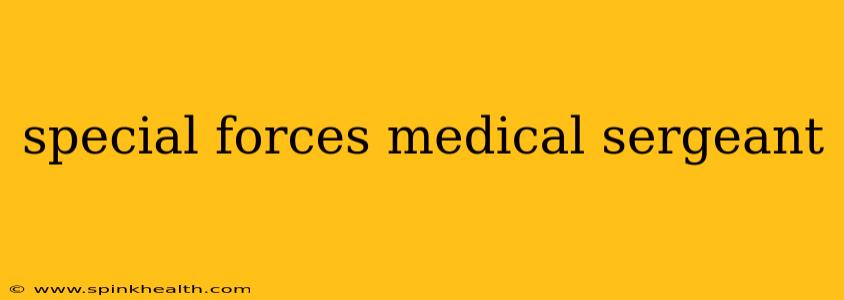The air crackles with tension. Dust devils dance across the barren landscape, mirroring the chaotic ballet of adrenaline coursing through my veins. I’m Sergeant First Class Ramirez, a Special Forces Medical Sergeant, and this is my office. It's not sterile and brightly lit like a hospital; it’s the unforgiving heart of a conflict zone, where survival hinges on split-second decisions and unwavering skill.
My day doesn’t start with a morning coffee and rounds; it begins with a pre-dawn briefing. Intelligence, mission parameters, potential threats – everything is meticulously reviewed. This isn't about treating routine injuries; it’s about preparing for the unexpected, the catastrophic. We're talking about trauma care under fire, where the operating room is a makeshift tent or the back of a Humvee, and the surgical tools are whatever we can improvise.
What does a Special Forces Medical Sergeant do?
This question gets asked frequently. It’s more than just patching up wounds. We are the critical link between survival and casualty, often the difference between life and death for our teammates. We're responsible for:
- Advanced trauma care: We’re trained to handle injuries far beyond what a typical medic can manage. Think massive blood loss, penetrating trauma, complex fractures—situations demanding immediate, decisive action.
- Combat casualty care: This involves rapid assessment, stabilization, and evacuation under fire. We're not just doctors; we're tactical medics, integrating seamlessly with the team.
- Preventive medicine: We monitor the health of our team, ensuring they're physically and mentally prepared for the demanding missions ahead. This includes everything from vaccinations and hygiene to stress management and mental health awareness.
- Medical training: We train our fellow operators in basic life support and combat casualty care, empowering them to provide immediate aid when needed. Every second counts in a combat situation, and every operator is a potential lifesaver.
What kind of training does a Special Forces Medical Sergeant receive?
The path to becoming a Special Forces Medical Sergeant is demanding and rigorous. It’s not a job for the faint of heart. It requires:
- Extensive medical training: We undergo years of medical training far beyond basic EMT certification. We're proficient in advanced airway management, intravenous therapy, wound care, and much more.
- Special Forces training: We must meet the demanding physical and mental standards of Special Forces selection, showcasing our resilience, adaptability, and teamwork skills.
- Combat experience: Practical application of medical skills under pressure is crucial. We learn to operate effectively in chaotic and high-stress environments.
What is the difference between a medic and a Special Forces medical sergeant?
The difference boils down to scope and environment. While a standard medic in the military handles routine medical issues and less complex battlefield trauma, a Special Forces Medical Sergeant deals with far more critical and complex injuries in vastly more dangerous environments. Our training and skills are highly specialized and geared towards operating in extremely hostile and unpredictable circumstances.
How does a Special Forces Medical Sergeant handle stress and trauma?
The psychological toll is immense. Witnessing the horrors of war, dealing with life-and-death situations daily, and shouldering the weight of responsibility for your teammates’ lives can leave lasting scars. We undergo rigorous psychological training to develop coping mechanisms and receive ongoing support to manage the stress and trauma we inevitably face.
What are the career opportunities for a Special Forces Medical Sergeant?
After leaving active duty, many Special Forces Medical Sergeants leverage their unique skills and experience in various fields:
- Civilian emergency medicine: Our advanced skills are highly sought after in high-pressure environments, like emergency rooms and air ambulance services.
- Security and protective services: Our training in tactical medicine makes us valuable assets in specialized security roles.
- Medical research and development: Many of us apply our knowledge and experience to advance medical technologies and treatments.
The setting sun casts long shadows across the desert. Another day ends, another mission accomplished. But the quiet moments after the chaos are when the reality sinks in – the weight of responsibility, the constant pressure, the profound impact of witnessing human fragility and resilience in its rawest form. This is more than a job; it's a calling, a commitment to the lives entrusted to my care, in the heart of the battlefield.

